Adding fast Meilisearch to an Astro Static Website
Integration of a search system to an Astro website is a bit troubling.
Astro doesn't provide any search system plugin now, as Gatsby.js does.
You may consider Google Custom Search, but it makes the fast static website slower.
This time, I tried Meilisearch - the newest search engine. I liked their simple system and succeeded in adding it to an Astro website.
The flow would be;
- Create a Meilisearch account
- Install meilisearch to the Astro project
- Build a dataset and send them to Meilisearch Cloud
- Create a search form/result component
- Import and show the component inside a component/page template
- Style the component
Working environment:
- Node v18.12.1
- Astro v2.0.11
- meilisearch v0.3.1
- dotenv v16.0.3
About Meilisearch
Though I've started using it, I have some following impressions:
- The newest search engine
- Self-hosted plan or cloud (freemium)
- The same parameters as Algolia (Algolia's docs can be helpful)
- Small problems remain for the Japanese language as of v.0.3.x
On Jan. 11th, 2023, Meilisearch pre-released v1.0.0-RC. (I haven't tried it in this post.)
Structure of the Astro project
In this example, the Astro project structure is as follows;
src/
└─ pages/
└─ posts/
├─ first-post.md
├─ second-post.md
└─ ...Also, the post Markdown YAML frontmatter is as follows;
---
title: My first post
slug: first-post
---
dignissimos aperiam dolorem qui eum facilis quibusdam animi sint suscipit qui sint possimus cum quaerat magni maiores excepturi ipsam ut commodi dolor voluptatum modi aut vitaeCreate a Meilisearch account
Though it's possible to run a self-hosted Meilisearch, we are using its Cloud version for this time.
The free plan includes 100,000 documents and 10,000 searches/per month. Enough for personal or small business websites!
Start it on their register page.
© Meilisearch
Confirm e-mail from Meilisearch.
Create a project on Meilisearch
Press "New Project" on Meilisearch Cloud after logging in, and start to create a new project.
© Meilisearch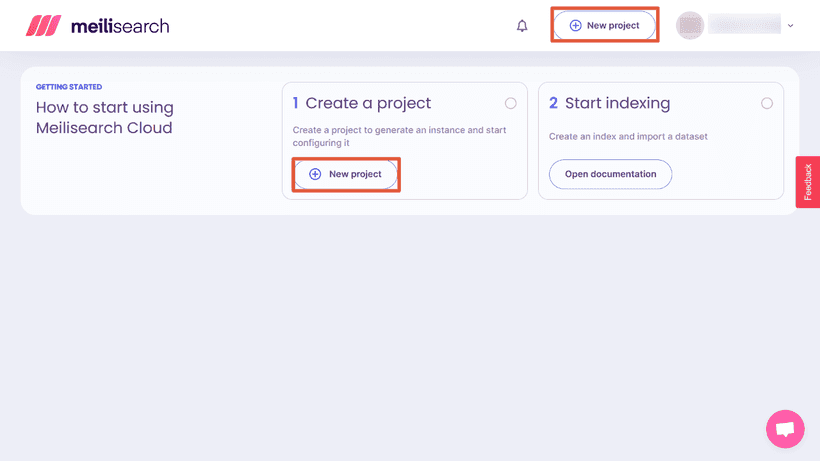
Choose the closest region from the "Select a region" and "Build $0 / month" plan.
© Meilisearch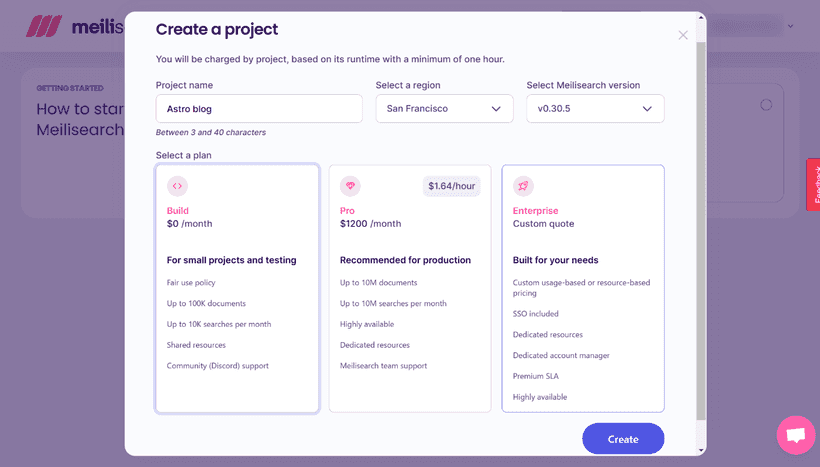
Then, press "Create" - it's ready!
Node is required for creating an index
If you already know Algolia, you might be flustered that Meilisearch doesn't accept editing/uploading data on the cloud.
The dataset (of documents) must be sent by running a javascript file with Node. I'll explain it later.
Install meilisearch and dotenv into the Astro project
To use Meilisearch in an Astro project, install meilisearch.
# for npm
npm install meilisearch
# for yarn
yarn add meilisearchBesides, install dotenv to use environment variables inside a .js file.
# for npm
npm install dotenv
# for yarn
yarn add dotenvBuild a dataset for the search
Next, create a .js file to build and send a dataset (documents) to Meilisearch Cloud.
meilisearch.jsunder thelibdirectory (file name and directory are up to you).envunder the project root
src/
├─ pages/
│ ├─ posts/
│ │ ├─ first-post.md
│ │ ├─ second-post.md
│ │ └─ ...
│ └─ lib/
│ └─ meilisearch.js <-- this and
├─ .env <-- thisEdit .env file
Add environment variables to the .env file.
PUBLIC_MEILISEARCH_HOST=https://ms-1234567890ab-1234.xxx.meilisearch.io/
PUBLIC_MEILISEARCH_SEARCH_KEY=xxxxxxxxxxxxxxxxxxxxxxxxxxxxxxxxxxx
MEILISEARCH_MASTER_KEY=xxxxxxxxxxxxxxxxxxxxxxxxxxxxxxxxxxxYou can find the host and keys on Meilisearch Cloud by clicking "Build" of the project.
© Meilisearch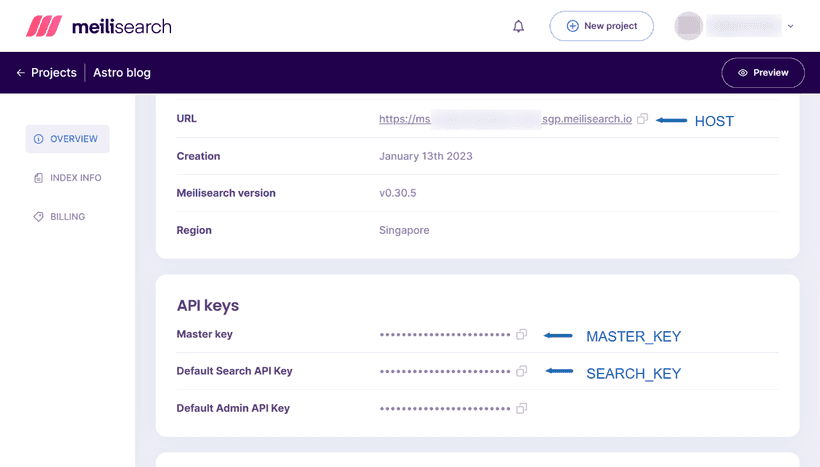
Create meilisearch.js
Next, create a javascript file to send index documents to Meilisearch Cloud.
The base code
The base code to send a dataset to Meilisearch Cloud would be as follows;
import { MeiliSearch } from "meilisearch"
const client = new MeiliSearch({
host: "HOST URL",
apiKey: "API KEY",
})
client.index("INDEX NAME").addDocuments("JSON DATA")
// .then((res) => console.log(res))We need to collect data from all the posts and provide it as "JSON DATA" to Meilisearch Cloud.
Import dotenv
At the top of meilisearch.js, enable dotenv.
import * as dotenv from "dotenv"
dotenv.config()
// to be continuedAdd the base code
Then, add the base code; I named the index "posts" (it's up to you).
// continued
import { MeiliSearch } from "meilisearch"
const client = new MeiliSearch({
host: process.env.PUBLIC_MEILISEARCH_HOST,
apiKey: process.env.MEILISEARCH_MASTER_KEY,
})
// 1. Build a dataset (explained later)
// 2. Send the dataset in JSON format
client
.index("posts")
.addDocuments("JSON DATA")
.then(res => console.log(res)) //show the resultBuild a dataset for the search
Next, build a dataset of documents.
This example Astro project uses Markdown posts. If you use a CMS, fetch the content instead of retrieving markdown files.
To remove markdown tags, I use remove-markdown. Please install it if needed.
// continued
// 1. Build a dataset
import fs from "fs"
import path from "path"
import matter from "gray-matter"
import removeMd from "remove-markdown"
const filenames = fs.readdirSync(path.join("./src/posts"))
const data = filenames.map(filename => {
try {
const markdownWithMeta = fs.readFileSync("./src/posts/" + filename)
const { data: frontmatter, content } = matter(markdownWithMeta)
return {
id: frontmatter.slug,
title: frontmatter.title,
content: removeMd(content).replace(/\n/g, ""),
}
} catch (e) {
// console.log(e.message)
}
})
// 2. Send the dataset in JSON format
// ...The keys on the code above are;
- Because
import.meta.glob()doesn't work, use fs・path・matter (no installation required) idis required. I put the slug as id.- By
content,I added the full text. You can useslice()to make it shorter or use an excerpt instead.
Send the dataset
Format the dataset data as JSON format and put it in addDocuments().
// continued
// 2. Send the dataset in JSON format
client
.index("posts")
.addDocuments(JSON.parse(JSON.stringify(data))) //<--this
.then(res => console.log(res)) //show the resultThe whole code of meilisearch.js
import * as dotenv from "dotenv"
dotenv.config()
import { MeiliSearch } from "meilisearch"
const client = new MeiliSearch({
host: process.env.MEILISEARCH_HOST,
apiKey: process.env.MEILISEARCH_MASTER_KEY,
})
// 1. Build a dataset
import fs from "fs"
import path from "path"
import matter from "gray-matter"
import removeMd from "remove-markdown"
const filenames = fs.readdirSync(path.join("./src/posts"))
const data = filenames.map(filename => {
try {
const markdownWithMeta = fs.readFileSync("./src/posts/" + filename)
const { data: frontmatter, content } = matter(markdownWithMeta)
return {
id: frontmatter.slug,
title: frontmatter.title,
content: removeMd(content).replace(/\n/g, ""),
}
} catch (e) {
// console.log(e.message)
}
})
// 2. Send the dataset in JSON format
client
.index("posts")
.addDocuments(JSON.parse(JSON.stringify(data)))
.then(res => console.log(res)) //show the resultNow, meilisearch.js is done!
Execute meilisearch.js with Node
Once meilisearch.js is ready, execute it with Node.
At the root of the Astro project, run the following code. *If you put the file under another directory, run that file.
node src/lib/meilisearch.jsOnce the dataset is sent without error, you'll see the result thrown by console.log(res) added at the end of meilisearch.js.
EnqueuedTask {
taskUid: 0,
indexUid: 'posts',
status: 'enqueued',
type: 'documentAdditionOrUpdate',
enqueuedAt: 2023-01-13T04:45:26.891Z
}Then, go to Meilisearch Cloud and see the index. Yes, the dataset (of documents) has been indexed.🙂
© Meilisearch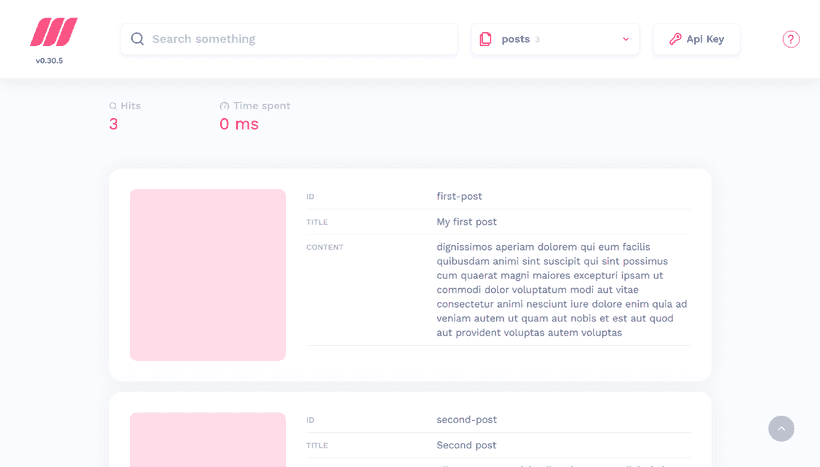
Create a component for the search box and search result
Finally, let's display a search box and the search result.
Create a component file named Search.astro (the name is up to you) under the components directory.
src/
├─ components/
│ └─ Search.astro <-- this
├─ pages/
│ ├─ posts/
│ │ ├─ first-post.md
│ │ ├─ second-post.md
│ │ └─ ...
│ └─ lib/
│ └─ meilisearch.js
├─ .envReferring to the official guidance, I developed the component as follows;
<div class="wrapper">
<div id="searchbox"></div>
<div id="hits"></div>
</div>
<script
is:inline
src="https://cdn.jsdelivr.net/npm/@meilisearch/instant-meilisearch/dist/instant-meilisearch.umd.min.js"
></script>
<script
is:inline
src="https://cdn.jsdelivr.net/npm/instantsearch.js@4"
></script>
<script is:inline>
const search = instantsearch({
indexName: 'posts',
searchClient: instantMeiliSearch(
import.meta.env.PUBLIC_MEILISEARCH_HOST,
import.meta.env.PUBLIC_MEILISEARCH_SEARCH_KEY
),
})
search.addWidgets([
instantsearch.widgets.searchBox({
container: '#searchbox',
}),
instantsearch.widgets.configure({ hitsPerPage: 8 }),
instantsearch.widgets.hits({
container: '#hits',
templates: {
item: `
<a href='/{{#helpers.snippet}}{ "attribute": "id" }{{/helpers.snippet}}/'>
<h2 class="hit-name">
{{#helpers.highlight}}{ "attribute": "title" }{{/helpers.highlight}}
</h2>
<p>{{#helpers.snippet}}{ "attribute": "content" }{{/helpers.snippet}}...</p>
</a>
`,
},
}),
])
search.start()
</script>(Updated Jan 23, 2023) When we use external CDN scripts on Astro, we have to run CDN and our own scripts with is:inline. It loses page speed because they are inserted between HTML tags.
Now, import this component inside other components or page templates.
The display would be like this;
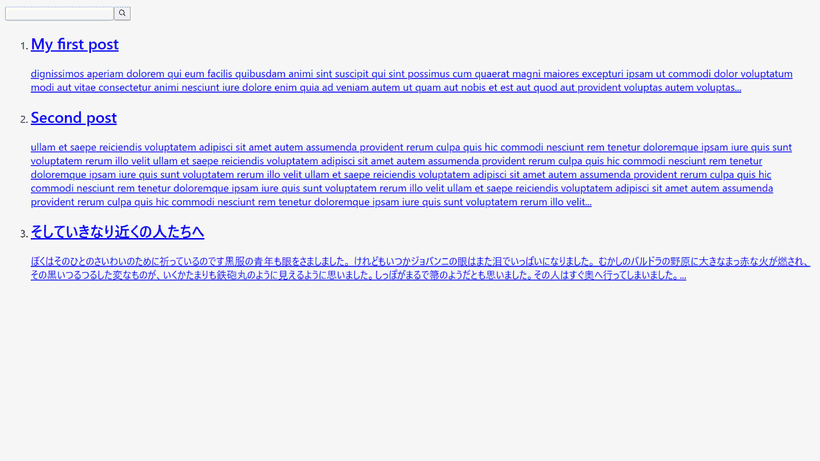
It would be better to import Search.astro inside a Modal component for a practical case. (Right before the body closing tag would be better.)
Styling the component
There are some options to style the Meilisearch component.
- Check the class names and style them by yourselves
- Use satellite.css by Algolia Official (npm ou CDN)
- Use basic_search.css by Meilisearch Official (CDN)
Because Meilisearch applies the same class names as Algolia, we can use the same styling.
Check the class names and style them by yourselves
For the classes not indicated on HTML in .astro files, apply is:global for the <style></style> tag.
<!-- continued -->
<style is:global>
.ais-Hits-item {
margin-bottom: 1em;
}
</style>satellite.css by Algolia Official
Reference Style your widgets
in case of using package
# for npm
npm install instantsearch.css
# for yarn
yarn add instantsearch.css---
// Include only the reset.css
import 'instantsearch.css/themes/reset.css'
// or include the full Satellite theme
import 'instantsearch.css/themes/satellite.css'
---
<div class="wrapper">
<div id="searchbox"></div>
<div id="hits"></div>
</div>
// ...in case of CDN
<link
rel="stylesheet"
href="https://cdn.jsdelivr.net/npm/[email protected]/themes/satellite-min.css"
integrity="sha256-TehzF/2QvNKhGQrrNpoOb2Ck4iGZ1J/DI4pkd2oUsBc="
crossorigin="anonymous"
/>Styled example
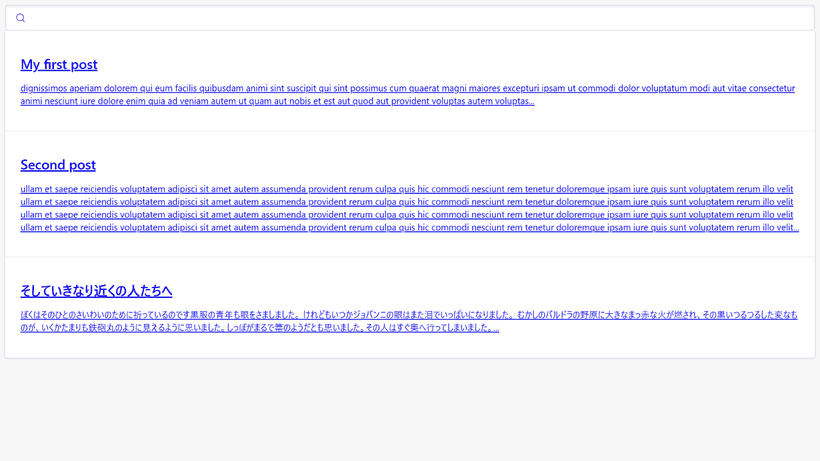
basic_search.css by Meilisearch Official (CDN)
Load the stylesheet from CDN.
<link
rel="stylesheet"
href="https://cdn.jsdelivr.net/npm/@meilisearch/instant-meilisearch/templates/basic_search.css"
/>Styled example
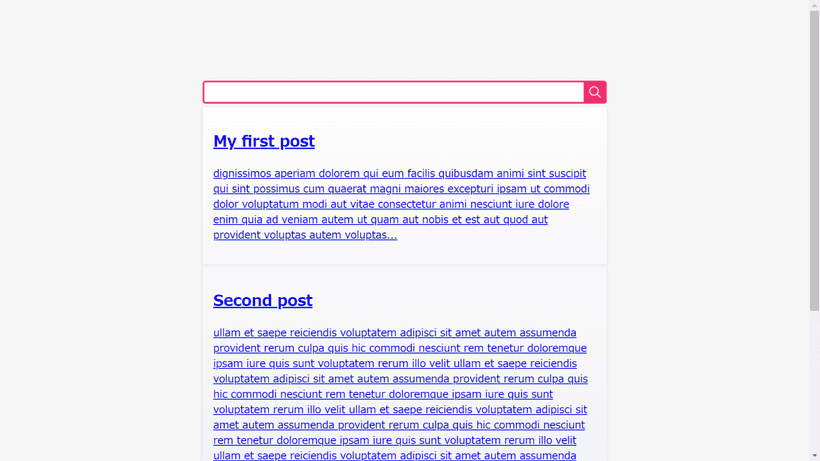
Conclusion
The explanation is long, but these steps are not complicated, I suppose.
Because Meilisearch is the newest search result service, its free plan offers some better conditions than Algolia (though there are not as many high-tech features as Algolia)
Meilisearch can be a good choice if you want a "just a normal" search function.